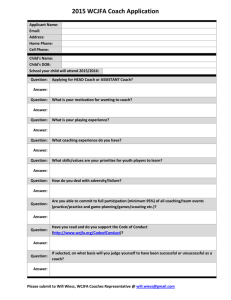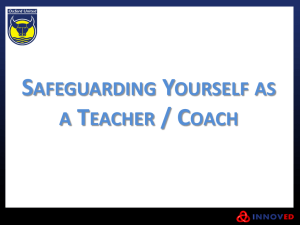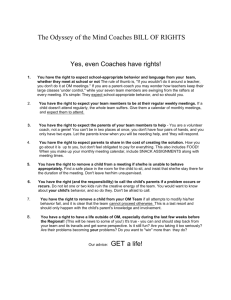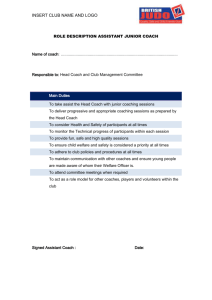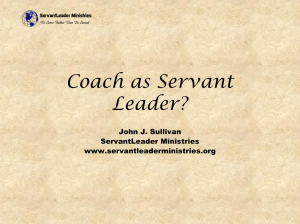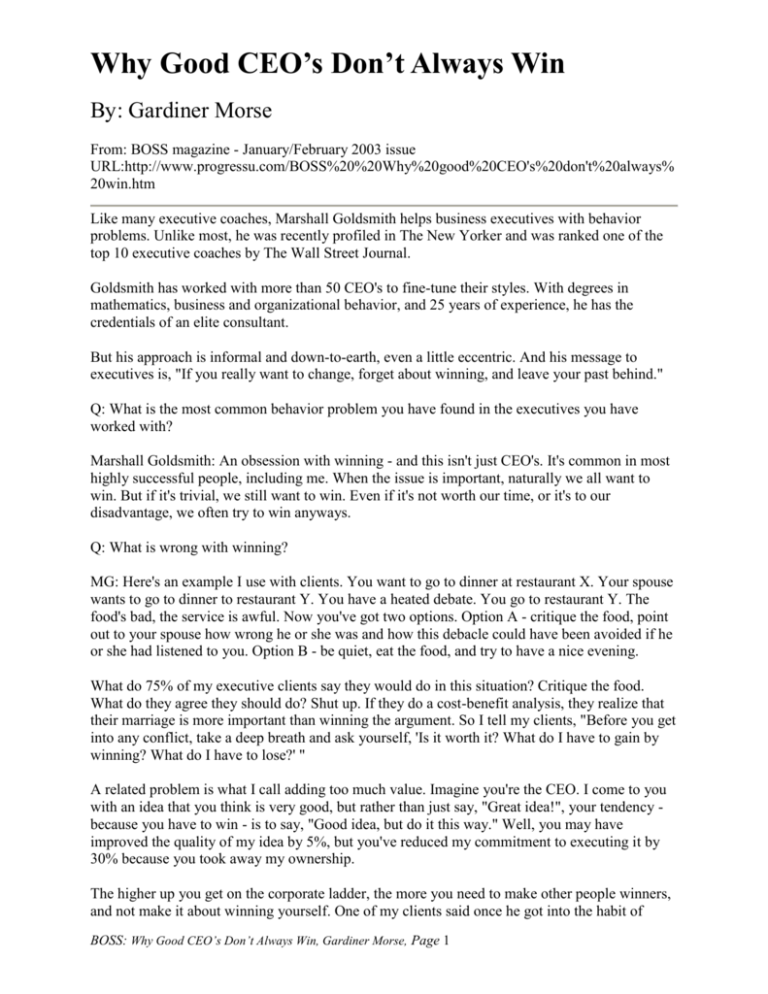
Why Good CEO’s Don’t Always Win
By: Gardiner Morse
From: BOSS magazine - January/February 2003 issue
URL:http://www.progressu.com/BOSS%20%20Why%20good%20CEO's%20don't%20always%
20win.htm
Like many executive coaches, Marshall Goldsmith helps business executives with behavior
problems. Unlike most, he was recently profiled in The New Yorker and was ranked one of the
top 10 executive coaches by The Wall Street Journal.
Goldsmith has worked with more than 50 CEO's to fine-tune their styles. With degrees in
mathematics, business and organizational behavior, and 25 years of experience, he has the
credentials of an elite consultant.
But his approach is informal and down-to-earth, even a little eccentric. And his message to
executives is, "If you really want to change, forget about winning, and leave your past behind."
Q: What is the most common behavior problem you have found in the executives you have
worked with?
Marshall Goldsmith: An obsession with winning - and this isn't just CEO's. It's common in most
highly successful people, including me. When the issue is important, naturally we all want to
win. But if it's trivial, we still want to win. Even if it's not worth our time, or it's to our
disadvantage, we often try to win anyways.
Q: What is wrong with winning?
MG: Here's an example I use with clients. You want to go to dinner at restaurant X. Your spouse
wants to go to dinner to restaurant Y. You have a heated debate. You go to restaurant Y. The
food's bad, the service is awful. Now you've got two options. Option A - critique the food, point
out to your spouse how wrong he or she was and how this debacle could have been avoided if he
or she had listened to you. Option B - be quiet, eat the food, and try to have a nice evening.
What do 75% of my executive clients say they would do in this situation? Critique the food.
What do they agree they should do? Shut up. If they do a cost-benefit analysis, they realize that
their marriage is more important than winning the argument. So I tell my clients, "Before you get
into any conflict, take a deep breath and ask yourself, 'Is it worth it? What do I have to gain by
winning? What do I have to lose?' "
A related problem is what I call adding too much value. Imagine you're the CEO. I come to you
with an idea that you think is very good, but rather than just say, "Great idea!", your tendency because you have to win - is to say, "Good idea, but do it this way." Well, you may have
improved the quality of my idea by 5%, but you've reduced my commitment to executing it by
30% because you took away my ownership.
The higher up you get on the corporate ladder, the more you need to make other people winners,
and not make it about winning yourself. One of my clients said once he got into the habit of
BOSS: Why Good CEO’s Don’t Always Win, Gardiner Morse, Page 1
taking a breath before he talked, he realized about half of what he was going to say wasn't worth
saying. Even though he thought he was right, he realized he had more to gain by not winning.
Q: What should an executive ask first in evaluating a coach?
MG: That's easy - "What do you specialize in? What are you best at?" I often hear, "A great
coach does this, and a great coach does that", as if there's some generic perfect coach. I don't
believe that. Many coaches will say they can address whatever problem you have when they
have no business trying to fix problems they don't know anything about. Good coaches
specialize. Get the right coach for the specific problem.
Q: What's the biggest mistake the executive client can make in working with a coach?
MG: There are two. The first, as I've said, is getting the wrong coach. The second is to expect
that it's the coach's responsibility to make you change. It's not the coach's job, it's yours. Too
many people think a "celebrity coach" will solve their problems. That's like thinking you'll get in
shape if you have the world's best personal trainer.
Q: You have a track record for helping executives change. What are you doing that's different?
MG: A key thing is, I don't hold myself up as "coach as expert". I'm much more "coach as
facilitator". Most of what my clients learn about themselves, they don't learn from me. They
learn from their friends and colleagues and family. Anybody around you can help you change,
and they can help you more than an executive coach can.
Let's say you want to do a better job of listening. Rather than having some coach explain to you
how to be a great listener, what you need to do is ask the people around you, "What are some
ways I can do a better job of listening to you?" They're going to give you concrete ideas that
relate to them, how they perceive you as a listener, not the generic ideas a coach would give. The
real coach isn't me, it's the people around you. If you want a better relationship with customers,
who needs to be your coach? Your customers. If you want a better relationship with co-workers,
who needs to be the coach? Your co-workers.
Q: Do your clients really change?
MG: The outcome I measure is the perception of change. How do my client's colleagues think he
or she is doing? It's much harder to change people's perceptions of someone's behavior than to
actually change that behavior.
Let's say the behavioral problem you want to fix is that you make too many destructive
comments. Scenario A - you assume the way to fix it is to tell people you're going to change and
you'll quit making destructive comments. But the reaction will be skepticisim. And if you have
one slip-up six months later, you call some guy in finance an "incompetent bean counter", it will
confirm your colleagues' perception of you.
Scenario B - you tell people you're going to change, you quit making destructive comments, and
you follow up. After two months, you ask your colleagues, "How am I doing at not making
destructive comments?" And they'll say, "Gee, I don't think I've heard any." Their skepticism
goes down a notch. You check in at four months, then six months. Each time, they confirm
you're doing better. Not only has your behavior changed, most important, their perception of
your behavior has also changed. So now, if you slip up with the guy in finance, your colleagues
will likely see it as a temporary lapse.
Your approach is to target a problem behavior and change it. Some critics say that's a flawed
approach because it ignores the possibly deep psychological bases of behavior. I don't agree with
that. Therapy is valuable for some types of problems, but it generally isn't relevant for the
behavioral issues I work with.
Virtually everybody I coach has reasons that are "not his fault" that make him behave the way he
does. I just tell them, "Let that go. Focus on what you can change."
When you're over 50, blaming mom and dad is weak. Can you imagine a CEO sitting down with
people and saying, "You know, I make too many destructive comments, and I analyzed why. It's
because of my father"? Forget it!
The message is, "You're an adult. Grow up! Take responsibility for your behavior."
GOLDSMITH'S TIPS FOR EXECUTIVES
Don't always insist on winning: Sometimes, you have more to gain by not winning. Before you
get into any conflict, ask yourself what you have to gain by winning, or what you stand to loose.
The right coach: There is no such thing as a generic perfect coach. Good coaches specialize.
Learn from around you: The real coaches are the people around you - your friends, family,
colleagues and business partners.
Changing others' perception: It's much harder to change what people think of your behavior than
to actually change that behavior. To change others' perception of you, first target a problem
behavior, tell them you're going to change, follow up with action, and check your progress with
these people at regular intervals. That way, they are made aware of the progress you've made.
Marshall Goldsmith (Marshall@MarshallGoldsmith.com) is corporate America's preeminent
executive coach and a founder of Marshall Goldsmith Partners.
Copyright © 2004 Gruner + Jahr USA Publishing. All rights reserved.
Fast Company, 375 Lexington Avenue.,New York , NY 10017


